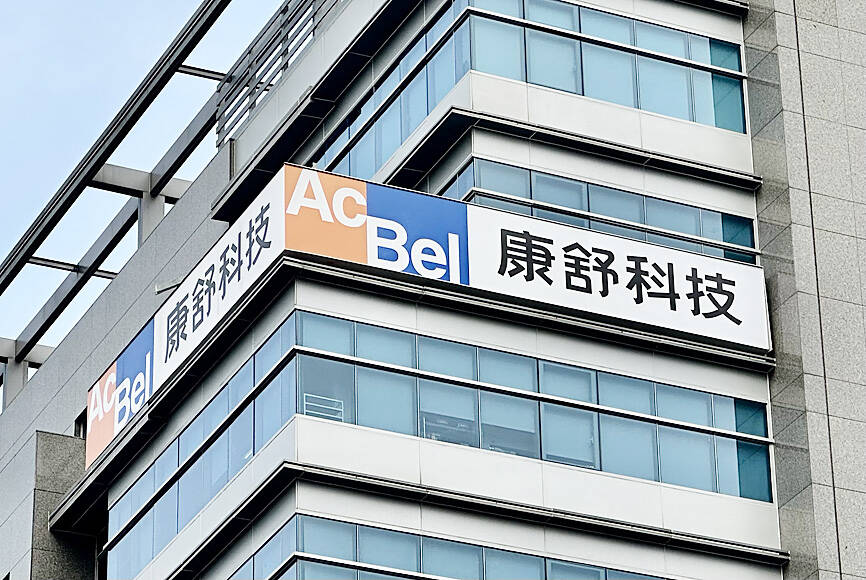Power management solutions provider AcBel Polytech Inc (康舒科技) has fully acquired ABB Ltd’s power conversion division in a cash deal worth US$505 million, it said on Monday.
AcBel said the transaction would create a more resilient and higher margin product portfolio, given the power conversion division’s exposure to the telecom, data center and industrial segments.
The division counts AT&T Inc, Verizon Communications Inc, T-Mobile US Inc, Alphabet Inc’s Google and Hewlett Packard Enterprise Co among its customers, it said.

Photo: Fang Wei-chieh, Taipei Times
All the prerequisites for the acquisition have been fully met including approval from the Committee on Foreign Investment in the United States, AcBel said.
“As the world ushers in the 5G era, industries are accelerating their development to offer innovative applications, giving a boost to the power industry,” AcBel chairman Jerry Hsu (許介立) said in a statement.
“The deep combination with the advanced technology and system solutions from the power conversion unit, AcBel will be able to provide customers with optimal product portfolios amid the growing trend of power efficiency demand from consumers and enterprises,” Hsu said.
AcBel expects strong growth of its power supplies used in electric vehicles this year, a new business that made a small revenue contribution last year.
AcBel’s revenue rose 15.59 percent year-on-year to NT$25.32 billion (US$813.73 million) last year, with 90 percent coming from sales of power supplies. Net profit increased 5.7 percent to NT$636.36 million, or earnings per share of NT$1.23.
The company said that power supplies used in consumer electronics such as desktop and notebook computers accounted for 49 percent of its sales last year, while those for servers, data centers and storage devices contributed 41 percent.
AcBel shares rose 4.09 percent to close at NT$50.9 in Taipei trading yesterday, the highest since June 5, when shares closed at NT$51.2, Taiwan Stock Exchange data showed.

UNCERTAINTY: Innolux activated a stringent supply chain management mechanism, as it did during the COVID-19 pandemic, to ensure optimal inventory levels for customers Flat-panel display makers AUO Corp (友達) and Innolux Corp (群創) yesterday said that about 12 to 20 percent of their display business is at risk of potential US tariffs and that they would relocate production or shipment destinations to mitigate the levies’ effects. US tariffs would have a direct impact of US$200 million on AUO’s revenue, company chairman Paul Peng (彭雙浪) told reporters on the sidelines of the Touch Taiwan trade show in Taipei yesterday. That would make up about 12 percent of the company’s overall revenue. To cope with the tariff uncertainty, AUO plans to allocate its production to manufacturing facilities in

Taiwan will prioritize the development of silicon photonics by taking advantage of its strength in the semiconductor industry to build another shield to protect the local economy, National Development Council (NDC) Minister Paul Liu (劉鏡清) said yesterday. Speaking at a meeting of the legislature’s Economics Committee, Liu said Taiwan already has the artificial intelligence (AI) industry as a shield, after the semiconductor industry, to safeguard the country, and is looking at new unique fields to build more economic shields. While Taiwan will further strengthen its existing shields, over the longer term, the country is determined to focus on such potential segments as

TAKING STOCK: A Taiwanese cookware firm in Vietnam urged customers to assess inventory or place orders early so shipments can reach the US while tariffs are paused Taiwanese businesses in Vietnam are exploring alternatives after the White House imposed a 46 percent import duty on Vietnamese goods, following US President Donald Trump’s announcement of “reciprocal” tariffs on the US’ trading partners. Lo Shih-liang (羅世良), chairman of Brico Industry Co (裕茂工業), a Taiwanese company that manufactures cast iron cookware and stove components in Vietnam, said that more than 40 percent of his business was tied to the US market, describing the constant US policy shifts as an emotional roller coaster. “I work during the day and stay up all night watching the news. I’ve been following US news until 3am

COLLABORATION: Given Taiwan’s key position in global supply chains, the US firm is discussing strategies with local partners and clients to deal with global uncertainties Advanced Micro Devices Inc (AMD) yesterday said it is meeting with local ecosystem partners, including Taiwan Semiconductor Manufacturing Co (TSMC, 台積電), to discuss strategies, including long-term manufacturing, to navigate uncertainties such as US tariffs, as Taiwan occupies an important position in global supply chains. AMD chief executive officer Lisa Su (蘇姿丰) told reporters that Taiwan is an important part of the chip designer’s ecosystem and she is discussing with partners and customers in Taiwan to forge strong collaborations on different areas during this critical period. AMD has just become the first artificial-intelligence (AI) server chip customer of TSMC to utilize its advanced